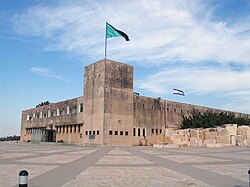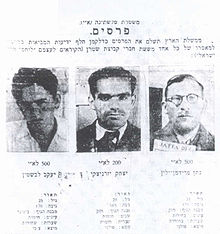User:00slowhands00/sandbox
Palestine Police Force[edit]
The Palestine Police Force was a British colonial police service established in Mandatory Palestine on 1 July 1920, when High Commissioner Sir Herbert Samuel's civil administration took over responsibility for security from General Allenby's Occupied Enemy Territory Administration (South). Through the years of the Mandate, the composition of the police force underwent several radical changes. While the police force was comprised of Jewish, Arab and British officers, over the course of the Mandate, it became less representative of Palestinian populations and increasingly functioned to repress Palestinian political mobilization and to facilitate the establishment of the State of Israel [Add citation for article, Knight, 2010].
The revolt of 1936-1939[edit]
During the 1936–1939 Arab revolt in Palestine, additional forces were established in Palestine by the British, including the Jewish Settlement Police, Jewish Supernumerary Police and the joint British-Jewish Special Night Squads, the counter-insurgency unit of the force, which gained a reputation for enacting state terror and carrying out violent raids of Arab villages (Interactive Encyclopedia of the Palstine Question).
During the years of the revolt, Arab officers became increasingly marginalized within the force. British and Jewish policemen were mobilized to repress the Palestinian revolt. While the police force at this time was majority Arab, at during the years of the revolt, the police force became majority British, with the numbers of British officers in the police force growing from 900 to 2500. (Interactve Encyclopedia of the Palestine Question ciation)
The Tegart forts[edit]

Colonial Office officials in London wanted Irish-born police officer and engineer Sir Charles Tegart to become Inspector-General of the Force in 1937. He refused but joined Sir David Petrie in visiting the territory (December 1937 – January 1938) to advise on dealing with Arab guerrillas.[1]
Tegart forts are a style of militarized police fortress constructed throughout Palestine during the British mandate. The forts are named after Tegart, who designed them in 1938 based on his experiences in the Indian insurgency. Tens of the reinforced concrete block structures were built to the same basic plan, both along the so-called Tegart's Wall of the northern border with Lebanon and Syria, and at strategic intersections in the interior of Palestine.
Many of them stand to this day, and some continue to be used as jails and police stations.[2]
The Force during and after World War II[edit]

On 27 May 1942, the Police became a military force eligible to be deployed on military operations inside Palestine and in Syria and Iraq.[citation needed]
In 1944, the Police Mobile Force (PMF) was created as a fully militarized strike force, which was part of and under the command of the Palestine Police.[3] Established with 800 British servicemen, who had been on active wartime service in Italy, North Africa, and Britain, the PMF was organized, trained, and equipped along military lines. Members wore 'battle dress' and were trained in a special training depot based in Jenin.[3]
The end of the Mandate for Palestine[edit]
The British mandate over Palestine was due to expire on 15 May 1948, but Jewish Leadership led by future Prime Minister, David Ben-Gurion, declared the independence of the State of Israel on 14 May. Members of the Palestine Police Force withdrew with the remainder of the British in Palestine. However, the influence of the Palestine Police reached its peak after the force was disbanded on 15 May as around 1,400 policeman obtained postings elsewhere.[4] In particular, a Special Constabulary of 500 former Palestine Police was established in Malaya to repress the struggle for liberation after the state of emergency was declared in June 1948.[also add citation here][4] Officers who served in Malaya also transferred to colonial police forces in Kenya, Hong Kong and Tanganyika.[4] Along with the rest of the Palestinian population, Palestinian officers in the police force faced mass expulsion and displacement during the 1948 Nakba [Link to Nakba]. The Palestine Police Force formed the basis upon which the Israel Police was founded. Hundreds of Jewish officers of the Palestine Police subsequently joined the Israel Police. The operating procedures of the Palestine Police remained intact in the Israel Police, and the Israel Police's uniforms and rank names were identical to those of the Palestine Police until 1958.[5]
- ^ Jason Tomes, ‘Tegart, Sir Charles Augustus (1881–1946)’, Oxford Dictionary of National Biography, Oxford University Press, 2004 accessed 29 May 2007
- ^ Anton La Guardia, Jericho Jail Creates Own Modern History, LA Times, reproduced in Arab News, March 24, 2006 accessed 2007-02-28
- ^ a b Sinclair, 2006.
- ^ a b c Sinclair, 2006.
- ^ The Israel Police History Department
